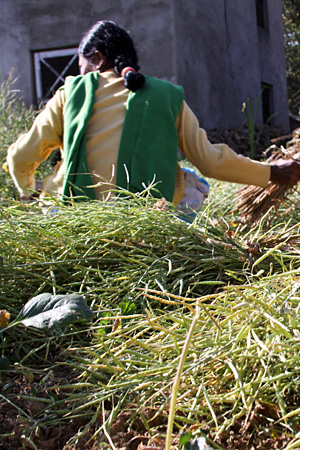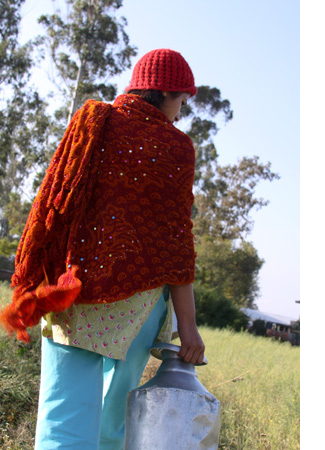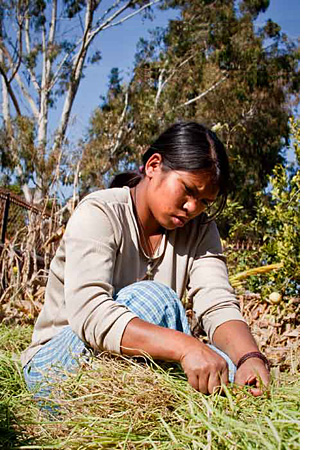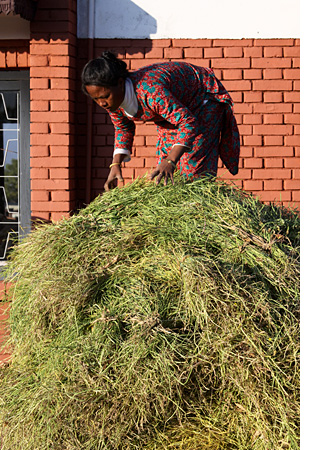Latest News:

 Ameena's Story: Child labor is the beginning of years of hardship for countless Nepalese. For girls, forced labor often precedes forced sexual acts. Ameena’s mother sent her to India to work when she was eight years old because she was unable to care for her. In a foreign country far from family, Ameena was alone. She was hired to clean and wash dishes in someone’s home. After a few years, the man in the house started to rape her.
Ameena's Story: Child labor is the beginning of years of hardship for countless Nepalese. For girls, forced labor often precedes forced sexual acts. Ameena’s mother sent her to India to work when she was eight years old because she was unable to care for her. In a foreign country far from family, Ameena was alone. She was hired to clean and wash dishes in someone’s home. After a few years, the man in the house started to rape her.At 14, she worked up the courage to leave, and took a six-hour bus ride back to Nepal. She had nowhere to go and no one to stay with. Ameena worked in rice paddies until, at 18, she met a Nepali soldier and his wife who hired her to cook and clean in their home. Soon after, the man started raping her, and over the next two years, he invited fellow soldiers to take their turn with her. This injustice caused Ameena extreme bitterness and resentment. It seemed her only way out was to do something drastic.
Ameena poured gasoline and lit the house on fire while the couple was away. When the police arrived, Ameena told her story. An officer who knew Shanta called PRC to ask if Ameena could go there.
When Ameena first arrived at the rehabilitation home last year, she was defeated and angry. “We never saw her happy face,” says Shanta. In the family setting of PRC, Ameena began to feel safe. Shy and sweet, Ameena is learning to sew. She is easily excited when talking about music or American movies. Standing with her arms outstretched, she says, “I’m king of the world,” quoting a line from the movie Titanic. This makes the other girls giggle and Ameena sits down laughing and embarrassed.
Ameena takes pride in being one of the best cooks at the PRC home. She enjoys preparing meals for her sisters. Shanta describes her as “such a good girl, a faithful girl.” Ameena hopes to someday find her mother.
 Chondra’s Story: Like most Nepalese, Chondra grew up in a poor rural region. Her parents’ work as seasonal laborers did not provide enough income for the family. Along with her parents and four siblings, Chondra lived in a small, one-room home. When she was 14, her father came home drunk and raped her. This abuse became common.
Chondra’s Story: Like most Nepalese, Chondra grew up in a poor rural region. Her parents’ work as seasonal laborers did not provide enough income for the family. Along with her parents and four siblings, Chondra lived in a small, one-room home. When she was 14, her father came home drunk and raped her. This abuse became common.Unhappy at home, Chondra was eager to believe a village boy who promised marriage and good jobs in India. They ran away to Delhi without telling her parents. Chondra lived with her fiancé’s family for three months until one day she overheard them talking. They had decided to sell Chondra to a brothel. Frightened about her future, she stole the equivalent of $14 USD and escaped. She took a bus to the India/Nepal border and was stopped by the PRC border patrol station. The border guards listened to her story and arranged for her to go to the rehabilitation home in Kathmandu.
Upon arrival at PRC, Chondra was very nervous and guarded, but remembers that “every girl said welcome and asked me who I was and where I was from. They were so welcoming.” She stayed in the home and learned about health and hygiene, cooking and sewing. Chondra knew that she had matured from all her experiences. She requested to return to her parents’ home. Shanta warned that returning to village life would be difficult, even equipped with a skill. Chondra insisted.
Back at her parents’ home, Chondra felt ashamed. Her neighbors gossiped that she had come home only to sleep with her father. In fact, her father again tried to force himself on her. Chondra was angry. She was determined to start a life away from her past. After one month, Chondra decided to leave her parents’ home and go back to PRC.
Shanta received a phone call from Chondra requesting to return. Two days later, Chondra burst through the doorway at PRC, tears streaming down her face. She ran into Shanta’s arms and said, “Mommy, I’m home.”
Laughter follows her throughout the house. She is a lighthearted young woman, known as the jokester, whom all the other girls love to be around. “If I have any opportunity, I do it now. I stand on my own feet,” she says. Chondra holds fashion shows in the dining room for the girls to display their traditional Nepali dress. On these nights they prepare for the fashion show by styling each other’s hair and painting each other’s nails.
Upon returning to PRC, she requested help for her 11-year-old sister. She fears her father will abuse her sister in Chondra’s absence.
 Kamala’s Story: Women who find their way out of the trafficking cycle may see the perpetrators walk free while they remain enslaved by painful memories. Bringing perpetrators to justice can help women move on with their lives.
Kamala’s Story: Women who find their way out of the trafficking cycle may see the perpetrators walk free while they remain enslaved by painful memories. Bringing perpetrators to justice can help women move on with their lives.Five days after being raped by her stepfather, Kamala told her mother. Angered, her mother kicked Kamala out of the house. She was homeless at the age of seven. She found a job in a hotel washing dishes and cleaning. In return for employment, Kamala was forced to have sex with hotel guests and staff. She ran away and found work as a housekeeper in Kathmandu. Again her employer raped her.
This went on until Kamala was 16 years old. She met a 60-year-old man who asked why she worked so hard for so little money. He promised to find her a well-paying job in India. First, she needed to get the citizenship documents and passport required for travel. Kamala had no money and no birth certificate to prove her Nepali citizenship. The man offered to pay for these documents, but in return he raped her and made her sell herself as a local prostitute while she waited for the paperwork to be processed. He began gathering 100 girls to sell into India’s sex industry.
During this time Kamala was befriended by a neighbor. Seeing that she was very ill, her neighbor warned Kamala that she might be infected with HIV and encouraged her to get tested. She told Kamala about PRC and helped her run away. Once she arrived, Kamala told Shanta about her broker and the 99 other girls. She wanted justice and had to be heard. Shanta and Kamala made a report to the police, who arrested the broker. He was sentenced to 19 years in jail. “That makes me happy,” says Kamala with an ear-to-ear smile.
“When Kamala arrived, she was sick and so skinny,” says Shanta. “She was suffering many things.” Kamala was brought to the doctor and found to have syphilis and gonorrhea. After gaining weight and receiving treatment for her illnesses, she is healthy. “My life was a mess before,” says Kamala, “only prostitution. But now, I am someone’s daughter. I would like to share with other girls about PRC’s love. I’d like to bring all the 99 ladies to PRC. I’m so glad. I’m learning sewing. I don’t know how to read but the teacher is slowly teaching me.”
 Buna’s Story: At the age of 18, Buna ran away to escape her father’s beatings. She moved into a Buddhist temple to find inner peace. One of the monks’ sons taught Buna about Buddhism. Then, explaining that she owed him something for his time, he made sexual advances. She felt betrayed and hopeless, but it was better than being beaten by her father. Word spread and other men living at the temple started raping Buna. Finally, after eight years, she ran away.
Buna’s Story: At the age of 18, Buna ran away to escape her father’s beatings. She moved into a Buddhist temple to find inner peace. One of the monks’ sons taught Buna about Buddhism. Then, explaining that she owed him something for his time, he made sexual advances. She felt betrayed and hopeless, but it was better than being beaten by her father. Word spread and other men living at the temple started raping Buna. Finally, after eight years, she ran away.For over a week, Buna lived in the woods and ate dried leaves and rice paddies. In desperation she returned to her village. Buna’s aunt and sister gave her money to open up a small tea shop. A man who came to her shop told her about the opportunity for good jobs in India. He said that he knew of a specific job opening. Eager to be away from her father, she agreed to go with the man.
Once in India, the man sold Buna to a brothel. Buna was horrified. She refused to sell herself and refused to eat. When she tried to drink water, the brothel owner screamed that if she wanted to drink anything she had to sell herself. Buna gave up all hope for her future and had her first client after five days. The brothel owner told Buna she had to work for three years to pay off her debt. Buna did not know how much the broker sold her for.
“My life was difficult,” says Buna. “I have been in brothels and many times I tried to commit suicide.” Each time this happened, the brothel owner beat her. Older women who lived in the brothel encouraged Buna to remain strong. After 22 months, Buna contracted tuberculosis and HIV and had three large abscesses on her body. Since she was too sick to work, the brothel owner kicked her out. Buna made her way to Kathmandu and checked into a hospital. There she met Shanta, who happened to be having surgery at the same hospital.
Shanta told Buna that she would care for her. Shanta brought Buna to her home before PRC was formed. Every day Shanta gave Buna food, changed her dressings on the abscesses and prayed for her. Buna was bitter, but slowly she began to trust Shanta. One day, Buna prayed. “I promised that if He gave me new life, I would tell everyone my story of love and life,” remembers Buna. That was 19 years ago. Buna is believed to be the longest-living HIV survivor in Nepal, at age 48.
“If I did not come to PRC, I would have died already,” Buna continues. “Because of PRC, I have life.”
Buna became an advocate against trafficking, walking from village to village. Her goal is to educate rural populations about the tricks traffickers use. “I walk house to house and say, ‘If new faces come to your village with the promise of good jobs in India, please do not believe them.’” People ask how she could know about this and she replies, “‘They told me the same things and took me to India and sold me into prostitution. Now I am HIV positive. I have come to share with you and to save you from the same fate.’”
Buna lives and works as a house mother in Chitwan, where she mentors the girls and enjoys spending time with them. She teaches them how to knit bags and purses to sell at the market. Through determination and hard work she is no longer defined by her illness. Buna is very proud of her story. She believes that because she shares it, others will not have to endure the hardships that she has.
Buna has found peace. “I would like to go to every country to tell my story,” she says.
Peace Rehabilitation Center was founded by Shanta Sapkota. She was born in the town of Gorkha, Nepal. Her father brokered an arranged marriage for her at the age of twelve, in order to get her out of the house. She was neglected in her new household and suffered from much physical and mental affliction. ( more )
| › Skill develop.. › Candle making › Pig/goat/cow.. › Sewing and knit.. › Spices production › Border monitor.. › Pokhara Orphans |
› Driving classes › Non-formal edu.. › Rehabilitation cent.. › Child care program ( more ) |
